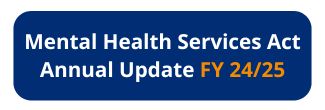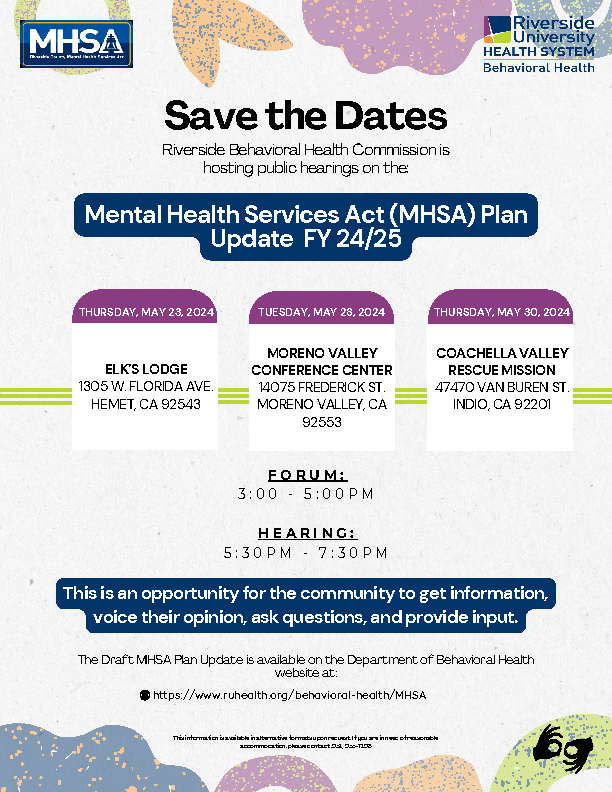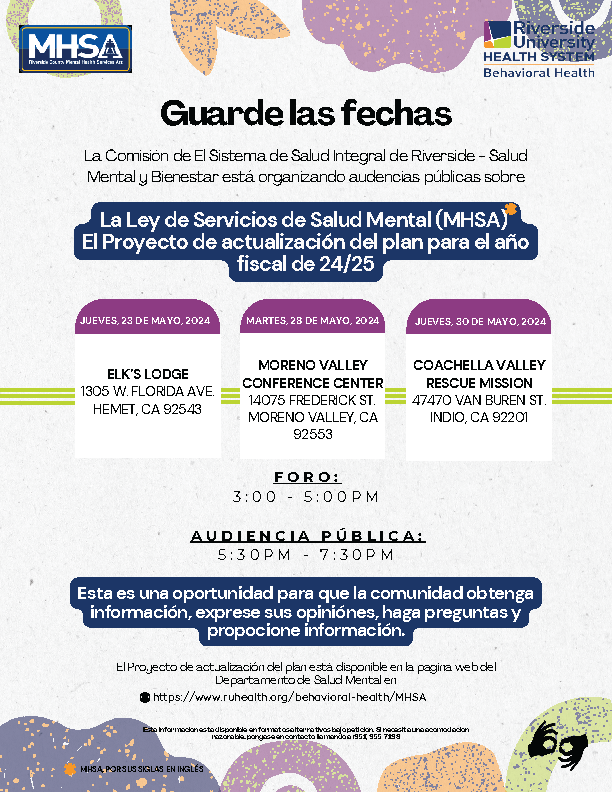MENTAL HEALTH SERVICES ACT (MHSA)
The Mental Health Services Act is a ballot measure passed by California voters in November 2004 that provided new funding for public mental health services. This funding provided for an expansion and transformation of the public mental health system with the expectation to achieve results such as a reduction in incarcerations, school failures, unemployment, and homelessness for individuals with severe mental illness. The programs funded through MHSA must include services for all ages: Children (0-16), Transition Age Youth (16-25), Adults (26-59), and Older Adults (60+). The MHSA Administrative Department manages the planning and implementation activities related to the five main required MHSA components which are: Community Services and Supports, Workforce Education and Training, Prevention and Early Intervention, Capital Facilities and Technology, and Innovation. MHSA funds cannot be used to supplant programs that existed prior to November 2004.



MHSA Community Services and Supports (CSS)
The CSS Plan is community based, focused on recovery, culturally competent, and includes consumers and family members in treatment service provision. Funding can only be used for voluntary services and no less than 50% must be targeted to “full service partnerships” (FSP). FSP provides wraparound-type services to help the most severely mentally ill clients and their families, twenty-four hours a day, seven days a week. These wraparound services include treatment, case management, transportation, housing, crisis intervention, education, vocational training and employment services, as well as socialization and recreational activities, based upon the individual needs for successful treatment outcomes.
MHSA Workforce Education and Training (WET)
The primary mission of the Workforce Education and Training program is to develop and provide programs that enhance the recovery-oriented treatment skills of the public mental health service system and to develop recruitment and retention strategies for qualified professionals serving community mental health. Education and training programs are consumer-centered, culturally competent, and driven by the values of wellness, recovery, and resiliency.
MHSA Prevention and Early Intervention (PEI)
The intent of the Prevention and Early Intervention (PEI) programs is to engage individuals before the development of serious mental illness or serious emotional disturbance, or to alleviate the need for additional or extended mental health treatment. These programs are provided in places where mental health services are not traditionally given, such as schools, community centers, faith-based organizations, etc.
MHSA Capital Facilities and Technological Needs
A portion of the MHSA funds have been specifically set aside for Capital Facilities which allows counties to acquire, develop or renovate buildings to house and support MHSA programs. Technological Needs supports counties in transforming and modernizing clinical and administrative information systems as well as increasing consumer and family member’s access to health information within a variety of public and private settings. The State gave counties the flexibility to determine what percentage of funding would be applied toward either Capital Facility or Technology.
MHSA Innovation
Innovation Programs are defined as novel, creative, and/or ingenious mental health practices or approaches that are expected to contribute to learning, which are developed within communities through a process that is inclusive and representative of unserved and underserved individuals. The Innovation Component allows counties the opportunity to “tryout” new approaches that can inform current and future mental health practices/approaches and contributes to learning rather than having a primary focus on providing a service. Innovation projects are subject to one-time funding with time limitations to assess and evaluate their efficacy and are time-limited with one-time funding.
2085 Rustin Avenue
Riverside, CA 92507
MHSA Administration
Phone: (951) 955-7122
Fax: (951) 955-7205 |
WET Administration
Phone: (951) 955-7198
Fax: (951) 955-7207
|
PEI Administration
Phone: (951) 955-7156
Fax: (951) 955-7207
|
INNovation and
Cultural Competency
Phone: (951) 955-7163
Fax: (951) 955-7206 |